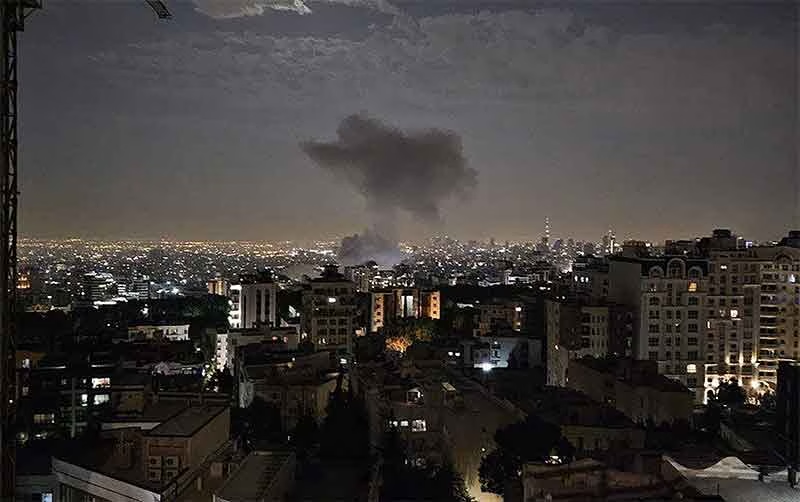
Those who seek to destroy others must realize that deliberate efforts to destroy others have the seeds of self-destruction in them.
While this can be understood at several levels, the most obvious is that all human beings have varying levels of human sensitivity which seeks to prevent them from causing serious and unreasonable harm to others or being unjust, destructive and cruel towards others. When defying their innate sensitivity, certain persons choose to be destructive towards others, then they need to curb or suppress their inherent human quality of being sensitive to the suffering of others.
When a larger number of such persons are carrying out destructive and unjust acts repeatedly as a matter of policy, then they need to make such attempts repeatedly to curb their sensitivity, or even to kill or murder their own sensitivity. This is a self-destructive act which facilitates the acts of destruction. Moreover, once sensitivity is deliberately suppressed or even killed, then this lack of sensitivity can spread to almost all aspects of life of the persons so affected so that they also become insensitive in their dealings with those close to them, at workplace, elsewhere and above all at home.
Of course not all persons are affected in the same way and to the same extent, and some persons also make strong efforts to resist such impacts and to provide better outlets for their pent up tensions and feelings. Here we are only describing some general and widespread trends.
The adversely affected persons would like to confine their lack of sensitivity only towards those they deem to be hostile but sensitivity does not exist like a button on human body which can be switched on and off. Once sensitivity is deliberately curbed or even killed in a particular context, this loss of sensitivity spreads like a poison to almost all aspects of life, resulting in the affected persons having an increased tendency of inter-acting in close relationships in selfish, deceitful, aggressive and violent ways. This inevitably increases distress and stress in daily life and in personal life. This in turn leads to increase of substance abuse. Increase of substance abuse is also related to efforts to seek escape from memories of cruel and unjust acts. All this can also lead to increase of suicidal tendencies or tendencies of self-harm. When this occurs among several people of a society, then at a wider level high rates of suicides, suicide attempts or suicidal thoughts, social disintegration, substance abuse and mental health problems are reported, although such inter-linkages are seldom explored adequately in the conventional approach to studying such issues.
In fact to draw attention away from all these unpalatable aspects, such societies also makes efforts to deny important truths, to deny injustice and aggression, hoping that such widely propagated denial will be widely accepted. However in reality what often happens is that while denial can be practiced at the more apparent surface level using vast resources, at a deeper level the realization of the reality continues to prevail widely; leading to increased cynicism, absence or rejection of idealism, social vacuum, high levels of escapism and substance abuse. This can tragically affect even more the young people whose higher sensitivity, not yet corrupted, really needs some ideals and struggles to cope with disturbing realities, leading to bursts of protests followed frequently by more enduring escapism and compromise of varying levels, as carefully crafted policies push them towards this.
While individual responses can vary greatly, the overall impact at a wider societal level of trying to destroy others is of self-destruction. One indication of such adverse impacts is available in some statements of the veterans of US armed forces. One of these statements, after describing the immense cruelties and killings of the Vietnam War said, “ We know what Post Traumatic Stress Disorder looks , feels and tastes like because the ghosts of over two million men, women and children still haunt our dreams. More of us took our own lives after returning home than died in battle.”
This is confirmed by a more detailed account of the life of a pilot whose napalm bomb had led to the burning of a Vietnamese girl Kim Phuc. After returning home, this pilot kept looking at the picture of Kim in flames. This girl was roughly the same age as his son. “He could almost smell the child’s burning flesh”. He had nightmares of screaming children pointing accusing fingers towards him. There was a breakdown in family. He began drinking heavily. “He drank to put the bombing out of his mind, and the drinking made him more obsessed.”(Reader’s Digest, November 1997).
This is by no means an isolated case. Problems of breakdown in close relationships, substance abuse, domestic violence, self-violence and suicide attempts have been found to be very high among soldiers who return home after fighting highly unjust wars. More commonly, anyone who performs unjust and exploitative actions over a period of time is likely to be able to continue this only by giving up on the sensitivity needed for care, compassion and love. Hence this person’s ability to fulfill close relationships based on this declines steadily, as also his ability to experience those forms of happiness associated with real love, caring relationships and compassion.
At a wider level, a group or society which seeks to enrich itself by plundering and exploiting others has to spread value systems which makes their members insensitive to the sufferings of others, but in the process of making them insensitive the foundation for breakdown of internal social relations (including the closest ones), internal violence, self-violence and falsehoods is also prepared. This can be seen in exploiter and conqueror societies (from the days of the Roman empires to present times) and also at individual levels, in the hollow lives of those who cause or promote unjust aggressions.
To give one example of such impacts, the example of Columbus may be cited. Extreme cruelties driven by endless greed of this explorer are well-known. What kind of personality this turned him into is best revealed by a reputed doctor Sigmundo Feliz who attended to him in his last years—“To be without roots, without a sense of home and place is one of the most serious, though one of the least emphasized, psychological disorders. This patient suffered from this to an unusual degree…This patient appears from all evidence to be someone who found it difficult, even in non-threatening circumstances, to tell the truth, a habit of delusion that at times turned into self-delusion.” This tendency can be seen even today at top levels in conquering and dominating societies.
At the level of wider societies or rather wider society segments, those societies which lead by aggression towards others, culminating in wars, are often involved in spreading falsehoods and self-delusions, media and education systems being two commonly used channels. The big lies cooked up to justify aggression for plunder or domination get transferred also to almost equally big lies cooked up to justify internal exploitation by big business interests. Hence people are exposed to serious health hazards by big business interests; in some cases the toll in the longer term may be higher than that of even destructive wars. The extremely high number of cancers and other serious diseases linked to proliferation of hazardous products and technologies is well-known, but the situation relating to this may be much more serious if all facts are known or investigated properly.
The aggression abroad is also reflected in internal violence, with many societies known for pursuing externally aggressive policies also known for very high levels of internal violence. Those known for instigating external coups and assassinations may also cause the internal assassination of those top leaders who are dedicated to the cause of peace, justice and sincere reform, and internal democracy may be seriously harmed by the same agents and forces that are in the forefront of promoting external aggression. In certain situations, external wars may lead ultimately to internal civil wars as well as wars among friendly countries which had earlier colluded for attacking and exploiting others. History has several examples, which can be repeated.
In fact if the history of the past over 500 years is to be captured in just one sentence, then basically what has happened is that highly destructive colonial exploitation and wars ultimately led to extremely destructive wars among and within colonial powers themselves, and those who rose from ruins with the same destructive (and self-destructive) dominance agenda have now brought the world very close to possibilities of total ruin.
This writer has been emphasizing the linkages between destruction and self-destruction, between conquest and internal distress, dominance and self-harm for several years with the hope that wider realization of such linkages will lead to higher sense of urgency for reform that can integrate moving away from external aggression with internal reform aimed at reducing social disintegration/violence and improving welfare. In this context this writer had also written a small book titled ‘Burning on Both Ends’ which argued that the tendencies of domination, exploitation and conquest involve ‘burning’ or extreme suffering on ‘both ends’ i.e. at the level of not just the victim but also the perpetrator. While I tried to establish this at wider levels of international situations, I also argued that in understanding social, family and individual distress also it is helpful to remember that those who are aggressive and unjust towards others become more prone to self-harm and even self-destruction without realizing this.
Some of the social data for conquering societies points to a deep internal social crisis that can arise within an exploiter and conqueror society known for its invasions and aggressions. Careful research is likely to reveal more links of external aggression and internal distress. Such research should be used to convince more and more people about the futility of paths based on exploitation, dominance and conquest, and hence paving the way for integrated reform, aimed at increasing peace and reducing distress.
Subscribe to Our Newsletter
Get the latest CounterCurrents updates delivered straight to your inbox.
Bharat Dogra is Honorary Convener, Campaign to Save Earth Now. His recent books include Planet in Peril, Earth without Borders, A Day in 2071, Saving Earth for Children and Man over Machine-A Path to Peace.













































